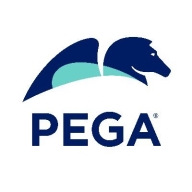

Pega Platform and ELMA 365 are business process management software products. ELMA 365 is noted for its comprehensive features and perceived value, whereas Pega Platform is recognized for customer support and pricing.
Features: Pega Platform includes process automation, case management, and application development with AI-powered analytics. ELMA 365 integrates a workflow automation suite with CRM and collaborative tools for dynamic environments.
Ease of Deployment and Customer Service: Pega Platform offers solid deployment options and responsive customer service for easy implementation. ELMA 365 provides efficient cloud-based deployment but less comprehensive customer support.
Pricing and ROI: Pega Platform features competitive pricing with flexible scales for a good return on investment. ELMA 365 provides cost-effective solutions with substantial ROI from its rich features.

What is ELMA 365?
ELMA 365 is a low-code BPM platform that helps businesses accelerate digital transformation and innovate faster. With ELMA365 you can deliver enterprise-grade apps and automate processes with little to no coding.
ELMA 365 Applications
ELMA 365 integrated applications cover all your business needs:
• Sales & Customer Relationship Management (CRM);
• Content and Document Management (ECM);
• Project Management;
• Robotic Process Automation (RPA)
and more.
The BPM app allows non-technical users to effortlessly create even the most complex business processes. Drag-and-drop process designer provides simplicity for modelling and accelerates the implementation of changes. Built-in monitoring tools help find bottlenecks and improve overall company’s performance.
The CRM app introduces a holistic approach to customer relationships management and sales. The whole process is automated and managed from the lead acquisition to closed deal, including processing of documentation and post-sale service.
The ECM app facilitates document management and electronic data exchange, all powered by a BPM engine.
The Projects app helps employees plan and control project activities, communicate, stay within budget and on schedule.
The RPA app prevents human errors and speeds up the working process by delegating routine tasks to software robots.
Pega Platform facilitates business process management, case management, and workflow automation for industries like banking, insurance, and healthcare. It supports digital transformation and customer service enhancements with its low-code capabilities and seamless integrations.
Pega Platform enables users to create efficient systems for case management, financial operations, and digital transformations. It provides tools for client onboarding, quoting, claims processing, customer experience improvements, and content management. Pega's low-code approach allows for the automation of complex processes, making it suitable for enterprises looking for adaptability and rapid deployment. While it offers strong real-time analytics and decision automation, users acknowledge challenges in user interface, integration, and performance aspects. High costs and a learning curve need attention, and enhancements in AI features and cloud services are desired.
What are the key features of Pega Platform?In banking, Pega Platform automates loan processing, accelerates customer onboarding, and manages compliance. Insurance companies benefit from streamlined claims processing and policy management. Healthcare sectors use the platform for patient engagement and care coordination, enabling organizations to adapt quickly to changing industry requirements.
We monitor all Business Process Management (BPM) reviews to prevent fraudulent reviews and keep review quality high. We do not post reviews by company employees or direct competitors. We validate each review for authenticity via cross-reference with LinkedIn, and personal follow-up with the reviewer when necessary.